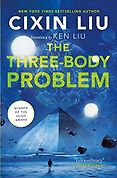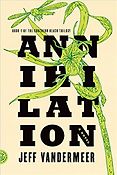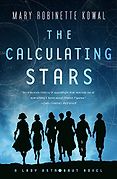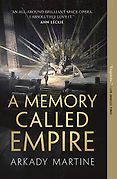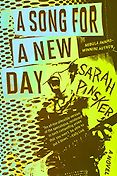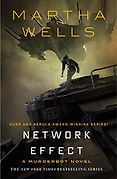Let’s start with the Hugo winner of 2015: Liu Cixin’s The Three-Body Problem.
This book was actually written in 2006, but not translated into English until 2014. We now have the complete trilogy in English, as well as a Netflix adaptation, and it’s a big name among sci fi fans.
Much of the book is spent guessing at the bigger-picture plot, so I don’t want to give too much of that away… The guessing happens in the company of nanotechnologist Wang Miao and detective Shi Qiang, who are investigating the multiple suicides of prominent scientists. In the course of their investigations, they play a VR game called Three Body. The challenge of the game is to help a planet whose climate is unpredictably destabilised by the presence of three stars in its sky; this produces cataclysmic changes which keep wiping out civilisations. Hence the title, The Three-Body Problem – the problem is a real unsolved problem in physics, how to predict the trajectories of three bodies that orbit each other if you have their initial positions and velocity.
As this suggests, this novel is not one to read with half a mind elsewhere. You’ll have to concentrate. But you’ll be rewarded, both with the high stakes plot the game reveals, and with the satisfaction of the meditative read along the way.
It’s a great example of sci fi in translation, too.
Yes! Very little of the enormous Chinese sci fi scene is translated into English, so it’s a pleasure to see this book so widely loved.
That year the Nebula also went to a sci fi title: Jeff VanderMeer’s Annihilation.
Yes, and again there’s been a complete trilogy in the meantime, plus a fourth addition in 2024. Annihilation itself is very short and intense and creepy and beautiful.
We follow four women on an expedition into Area X: the anthropologist, the psychologist, the surveyor, and our protagonist the biologist. We don’t know names, or much more about Area X; we are told very early that two of the band especially don’t need to be named, as they will die imminently. This is the whole tone of the novel – sparse, tense, mysterious.
For all that, the descriptions are incredibly evocative. VanderMeer has said the inspiration was a walk through a wildlife refuge, and that shines through. There are accurately-labelled features of wilderness mixed in with the invented and uncanny – the nightly distant moaning, the increasingly-hideous ‘tower’ – so that the lines between the two are blurred.
It’s a short read, and it grips you: a great choice if you feel a little out of the habit of immersive reading.
Both awards then go to fantasy books for the next three years…
Yes! That’s partly because the three books of N K Jemisin’s Broken Earth trilogy come in in 2016, 2017 and 2018, scooping the Hugo all three years, and the Nebula as well in 2018…
So let’s jump to 2019, when both the Hugo and the Nebula were won by Mary Robinette Kowal’s The Calculating Stars.
Yes – and the Locus Award for Best Sci Fi novel, and the Sidewise Award for Alternate History.
It’s 1952 – hence, the alternate history – and a meteorite has hit the USA. The immediate death and destruction is vast (and politically destructive too), but the real issue is down the road: as deduced by our protagonist Elma, the climate consequences are imminent and will make earth uninhabitable. The push for space begins. But it’s 1952, and sexism frustrates Elma’s push to be involved with the mission itself. When she makes it onto the team she’s a figurehead as the ‘lady astronaut’, and not everyone is pleased.
Kowal is reliably fun to read; Reactor Mag said of Calculating Stars, ‘The end of the world is no laughing matter, but Kowal knows well the importance of levity, and the healing power of a laugh.’
There’s a second book now too?
Yes, you can follow this one up with The Fated Sky, and there’s also a short story, The Lady Astronaut of Mars. The complete set has been nominated for the Hugo for best series, too.
Let’s talk about another duology, starting with the 2020 Hugo winner: Arkady Martine’s A Memory Called Empire.
Yes! This is one for fans of careful politics, although at the same time it’s a high-concept space adventure. Our hero Mahit is beginning her role as ambassador from tiny Lsel station to the interstellar empire Teixcalaan. Lsel are underdogs, but they have a technological advantage which they guard secretively: the imago-machine, which allows the memories of one person to be integrated in the mind of another. Mahit’s predecessor died in mysterious circumstances and his imago is fifteen years out of date, so she is going without proper backup, and hasn’t had time to integrate him as she should. Both she and this new irascible voice in her head need to understand how and why he died, and deal with the greater political game that was afoot.
The stakes are high, but Mahit’s moves must be careful. She is navigating a culture she isn’t entirely fluent in. When we spoke to Martine about the duology, she said, “They’re about assimilation. They’re about imperialism. They’re about languages. And they’re what I did instead of writing the book that was supposed to be the book of my postdoc, about Byzantine and Armenian history of the 11th century.”
And jumping ahead a moment, Martine took the Hugo again in 2022 for the follow-up, A Desolation Called Peace?
Yes! So both come highly recommended. A Memory Called Empire does resolve very satisfactorily; we meet the same characters a few months later in A Desolation Called Peace. Expect the same blend of the wildly imaginative and the thoughtful: The Guardian described the second book as “first-class space opera, with added spycraft, diplomatic intrigue and scary aliens, along with interesting explorations of perception, ways of communicating, and what makes a person.”
Great! So, back to 2020: the Nebula that year went to A Song for a New Day by Sarah Pinsker. Can you introduce us?
Yes. The first thing to say about this book is that it was published in 2019, before Covid. I imagine most readers might assume otherwise now. It’s set in the near future: frightened by a combination of terror incidents and a pandemic, the world has gone inside and stayed there. Mass gatherings are still outlawed years later. If that didn’t feel enough like a post-Covid response, there’s even an illegal music venue called ‘The 2020’… It’s fascinating to read it now, and see what was psychologically insightful, what still resonates, what hits differently.
For all that, this is not really a book about pandemics. It’s about live music. We follow a musician committed to live gigs, and a younger music fan who only faintly remembers a different world. The fan gets a new job: she’s employed by the corporation with an effective monopoly on the music business. This brings the two across each other’s paths.
It’s a love song to watching and performing music live, and more broadly to making something, however small, rather than passively consuming. It’s a zippy read, driven by the page-turning missteps and misunderstandings. In amongst that, the sci fi elements – the near-future tech, and the implied commentary on our own direction of travel – are easily absorbed and believed.
In 2021 the Hugo and Nebula both went to Martha Wells’ Network Effect – and she’s started declining subsequent nominations for the Murderbot Diaries series, right?
Yes, that’s right. The eponymous Murderbot has captured hearts. It’s a SecUnit, a robot designed to be a controlled thug, but it’s slipped free of its ‘governor module’. Now it works voluntarily with a team of its preferred humans, and it does fundamentally care about them, but that doesn’t stop it being an introverted, cynical, weary creature that mostly wants to be left alone to watch TV. So, it’s relatable. And very funny.
Network Effect is the first full-length novel in the series. It’s worth starting at the beginning, with the novella All Systems Red: the series takes place in the future and in space, with a lot of new tech, and all the new political and commercial concerns of a navigable universe. You want to be brought into it all at the right speed, and if you read in order, Wells does it masterfully.
And finally, the latest winner: the 2024 Hugo went to Some Desperate Glory by Emily Tesh.
Yes! It was a tough field this year, so we have a very worthy winner here. Again we’re in the future, in space, with AI, but it’s an entirely different take. Earth has been destroyed, and we follow a young woman from the space station housing human survivors. They’re wronged, they’re angry, and they’re clearly being run as a tiny illiberal personal empire by their idolised leader. Valkyr only begins to wake up to this when she’s assigned to ‘nursery’ – child-bearing – instead of the soldierly posting she’d been expecting. From there, the unravelling of her world begins.
You think you’ve got the measure of the book, and then you meet the central AI and its capabilities, and a whole new sci fi element is introduced that re-opens the game. From here we see Valkyr and other characters in different alternate timelines, wrestling to change the final outcome. Some Desperate Glory is pacey, imaginative and very enjoyable.
January 17, 2025. Updated: February 12, 2025
Five Books aims to keep its book recommendations and interviews up to date. If you are the interviewee and would like to update your choice of books (or even just what you say about them) please email us at [email protected]
Five Books interviews are expensive to produce. If you've enjoyed this interview, please support us by donating a small amount.


